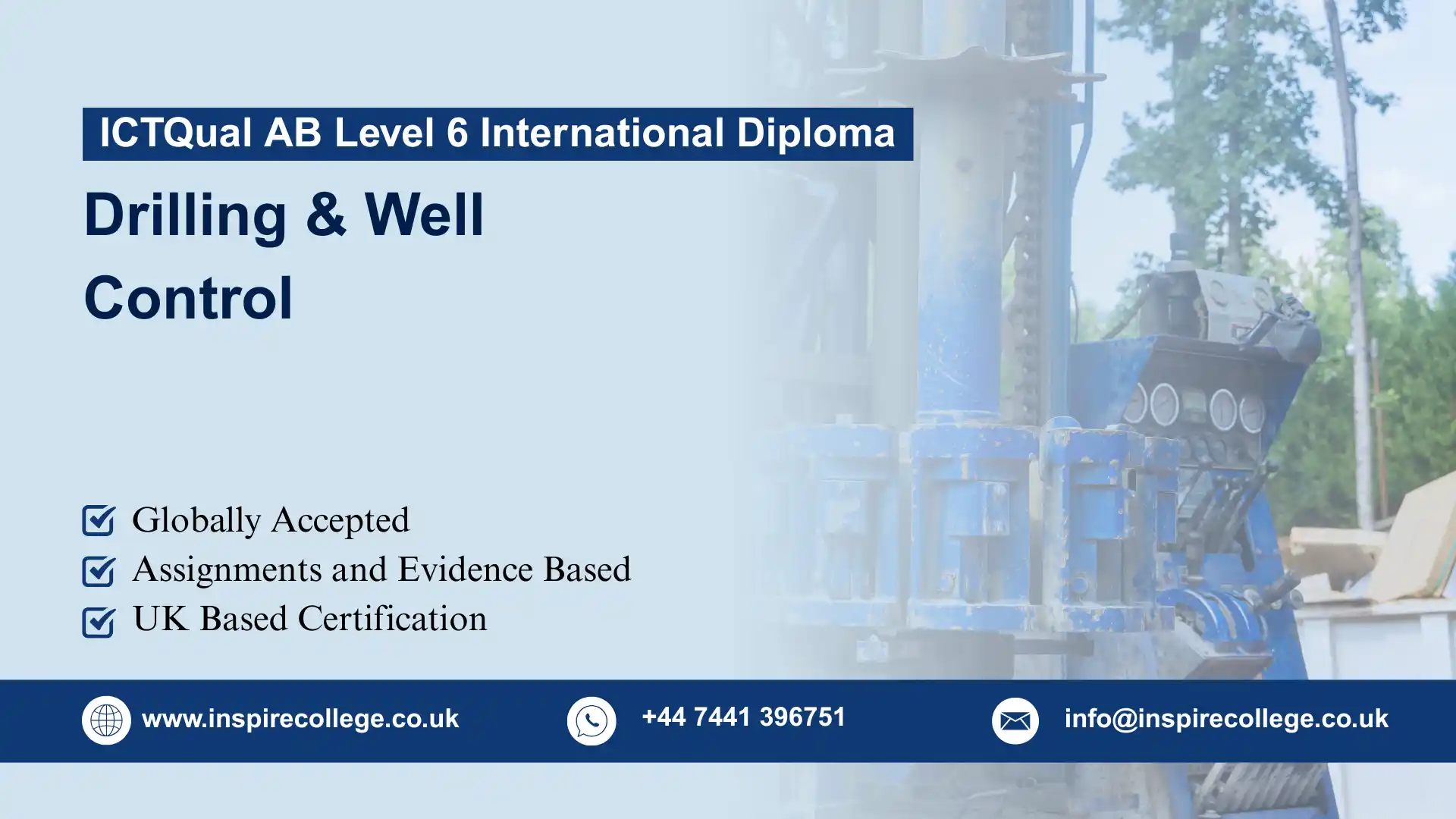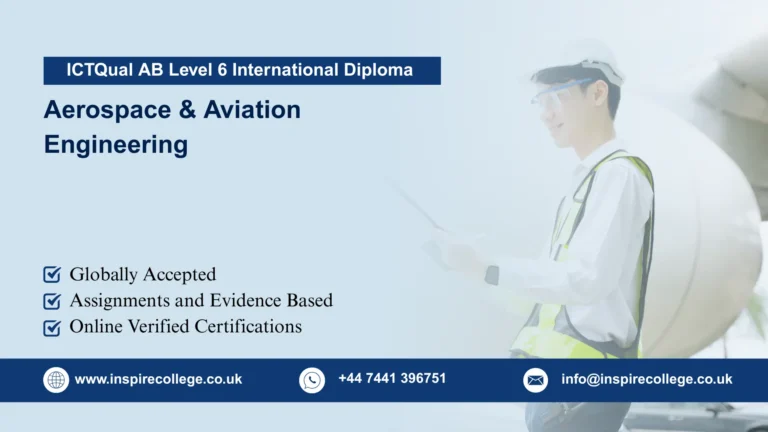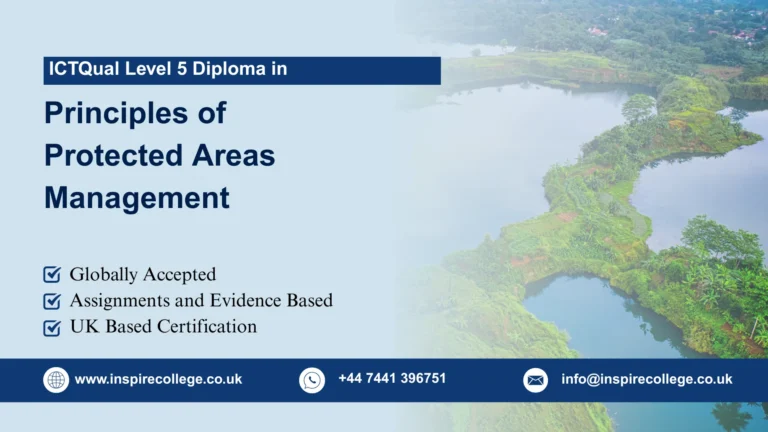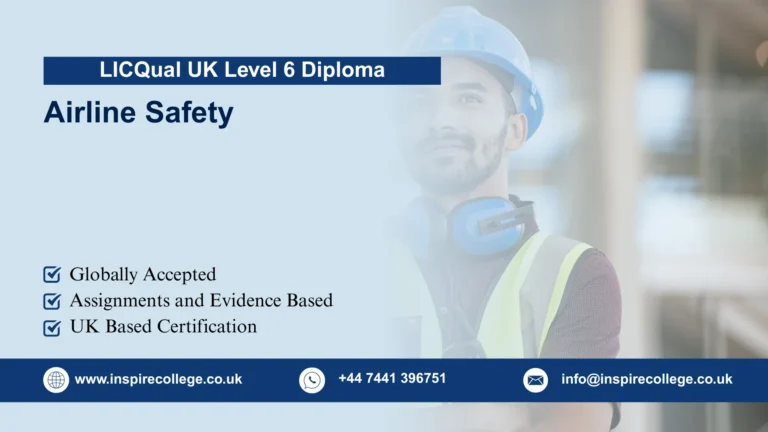
ICTQual AB Level 6 International Diploma in Drilling & Well Control
The ICTQual AB Level 6 International Diploma in Drilling & Well Control is a globally recognised qualification designed for learners aiming to excel in the oil and gas sector, particularly in drilling operations, well integrity, and safety management. This programme equips learners with advanced technical knowledge, practical skills, and strategic insight to manage complex drilling projects safely and efficiently.
Structured as a three-year, 360-credit programme, the diploma covers foundational drilling principles, intermediate operational practices, and advanced well control techniques. Learners gain expertise in areas such as drilling engineering, well planning, blowout prevention, safety protocols, and emerging technologies in well control. The programme is ideal for fresh learners seeking to start a career in drilling engineering as well as experienced professionals aiming to formalise their expertise and achieve internationally recognised certification.
By enrolling in this diploma, learners develop critical skills in risk assessment, emergency response, well monitoring, and project management, enabling them to ensure operational efficiency and safety in high-pressure drilling environments. The course also emphasises leadership, communication, and professional ethics, preparing learners for supervisory and strategic roles in drilling and well control operations globally.
Graduates of the ICTQual AB Level 6 Diploma are well-positioned to pursue careers in offshore and onshore drilling, well control supervision, drilling consultancy, petroleum project management, and safety compliance, both in the UK and internationally. With a combination of practical training, theoretical knowledge, and industry-relevant skills, this diploma provides learners with a globally recognised pathway to advance their careers in the drilling and oilfield engineering sector.
To enrol in the ICTQual AB Level 6 International Diploma in Drilling & Well Control, learners must meet the following criteria:
- Age Requirement: Learners must be at least 18 years old at the time of enrolment.
- Educational Qualifications: Applicants should hold a Level 5 Diploma, Higher National Diploma (HND), or equivalent in petroleum engineering, mechanical engineering, chemical engineering, or related disciplines. Fresh learners with strong foundational knowledge in engineering or oil and gas operations may also be considered.
- Professional Experience (Optional): While not mandatory, learners with 1–2 years of relevant experience in drilling, well operations, or oilfield engineering are encouraged to apply to enhance practical understanding.
- English Language Proficiency: Learners must demonstrate proficiency in English through IELTS (5.5 or above), TOEFL, or equivalent, ensuring effective engagement with course materials, assignments, and assessments.
- Technical Aptitude: Learners should have basic knowledge of engineering principles, technical problem-solving, and mathematics to successfully undertake advanced modules in drilling and well control.
- Registration Requirement: All learners must register with our ICTQual AB Approved Training Centre to access course materials, learning support, and assessment guidance.
By meeting these entry requirements, learners will be fully prepared to undertake this three-year, 360-credit programme, developing the technical, managerial, and safety skills required to excel in the drilling and well control sector, both in the UK and internationally.
Mandatory Units
This qualification, the ICTQual AB Level 6 International Diploma in Drilling & Well Control, consists of 36 mandatory units.
Year 1 – Foundation in Drilling & Well Control
- Principles of Drilling & Well Control
- Introduction to Petroleum Exploration and Production
- Drilling Rig Components and Operations
- Construction Materials and Methods in Drilling Projects
- Drilling Fluids and Wellbore Stability
- Project Planning and Scheduling in Drilling Operations
- Health, Safety, and Environmental Awareness in Drilling
- Communication and Stakeholder Management in Drilling Projects
- Digital Tools and Simulation Software in Drilling
- Financial Management in Drilling Projects
- Quality Assurance and Control in Well Operations
- Legal and Regulatory Frameworks in Drilling
Year 2 – Intermediate Drilling & Well Control Practices
- Advanced Drilling Techniques and Directional Drilling
- Well Design and Engineering Principles
- Pressure Control and Well Control Methods
- Casing, Cementing, and Well Completion Techniques
- Procurement and Supply Chain Management in Drilling Projects
- Risk Assessment and Mitigation in Drilling Operations
- Leadership and Team Management in Drilling Projects
- Offshore and Onshore Operations Management
- Sustainability and Environmental Management in Drilling
- Project Monitoring and Reporting in Drilling Projects
- Problem-Solving and Decision-Making in Well Operations
- Communication and Negotiation Skills in Drilling Projects
Year 3 – Advanced Drilling & Well Control and Strategic Leadership
- Strategic Project Management in Drilling Operations
- Advanced Well Engineering and Production Optimisation
- Reservoir and Formation Evaluation for Drilling Projects
- Innovation and Emerging Technologies in Drilling
- Advanced Risk and Crisis Management in Well Control
- Contract Management and Legal Compliance in Drilling Projects
- Leadership in Drilling and Well Control Operations
- Advanced Project Control and Performance Measurement
- Project Governance and Compliance in Well Operations
- Research Methods and Project Analysis in Drilling
- Capstone Project in Drilling & Well Control
- Professional Development and Career Planning
Learning Outcomes for the ICTQual AB Level 6 International Diploma in Drilling & Well Control:
Year 1 – Foundation in Drilling & Well Control
Principles of Drilling & Well Control
- Understand the fundamental concepts and principles of Drilling & Well Control.
- Explain the role of well control in maintaining operational safety.
- Identify the key processes and techniques used in drilling operations.
- Demonstrate knowledge of drilling terminology, tools, and equipment.
Introduction to Petroleum Exploration and Production
- Describe the stages of petroleum exploration and production.
- Identify different types of oil and gas reservoirs and their characteristics.
- Understand the basic geology and geophysics related to hydrocarbon extraction.
- Recognise the operational challenges in exploration and production projects.
Drilling Rig Components and Operations
- Identify the main components of drilling rigs and their functions.
- Explain standard rig operations for onshore and offshore projects.
- Understand rig safety protocols and operational workflows.
- Apply basic operational planning for drilling activities.
Construction Materials and Methods in Drilling Projects
- Describe common materials used in drilling operations.
- Understand construction methods for well sites and associated infrastructure.
- Evaluate material selection based on project requirements.
- Apply knowledge of construction techniques to drilling project planning.
Drilling Fluids and Wellbore Stability
- Explain the role and types of drilling fluids in well operations.
- Assess wellbore stability and techniques to prevent collapse.
- Understand fluid properties and their impact on drilling performance.
- Apply basic calculations for mud weight, flow rate, and pressure control.
Project Planning and Scheduling in Drilling Operations
- Develop basic project plans for drilling operations.
- Use scheduling tools to sequence drilling activities effectively.
- Identify milestones and critical paths in drilling projects.
- Monitor project timelines and adjust plans to maintain efficiency.
Health, Safety, and Environmental Awareness in Drilling
- Demonstrate awareness of drilling HSE regulations and standards.
- Identify common hazards in drilling operations and mitigation strategies.
- Apply safety protocols during practical exercises.
- Promote environmental responsibility in well operations.
Communication and Stakeholder Management in Drilling Projects
- Identify key stakeholders and their roles in drilling projects.
- Develop effective communication strategies for project teams.
- Prepare reports and documentation for operational updates.
- Manage stakeholder expectations through structured engagement.
Digital Tools and Simulation Software in Drilling
- Use drilling simulation software to model well operations.
- Analyse data to support planning and operational decisions.
- Apply digital tools to optimise drilling performance.
- Understand emerging technologies in digital drilling operations.
Financial Management in Drilling Projects
- Interpret project budgets, cost reports, and financial statements.
- Apply cost estimation and control techniques in drilling projects.
- Evaluate the financial implications of operational decisions.
- Implement cost-effective strategies for resource allocation.
Quality Assurance and Control in Well Operations
- Understand quality standards and procedures in Drilling & Well Control projects.
- Apply QA/QC techniques to ensure operational compliance.
- Monitor well performance and operational outcomes.
- Identify non-conformities and implement corrective actions.
Legal and Regulatory Frameworks in Drilling
- Understand local and international drilling regulations.
- Recognise contractual obligations and industry compliance standards.
- Apply legal frameworks to project planning and execution.
- Ensure operations adhere to statutory and regulatory requirements.
Year 2 – Intermediate Drilling & Well Control Practices
Advanced Drilling Techniques and Directional Drilling
- Apply directional and horizontal drilling methods to complex wells.
- Optimise drilling performance through advanced techniques.
- Analyse well trajectories and subsurface conditions.
- Implement safety and efficiency strategies during advanced drilling operations.
Well Design and Engineering Principles
- Develop comprehensive well designs for production and exploration wells.
- Apply engineering principles to ensure structural integrity and operational efficiency.
- Select appropriate casing, tubing, and completion strategies.
- Evaluate well design for safety, cost, and performance metrics.
Pressure Control and Well Control Methods
- Implement primary, secondary, and tertiary well control techniques.
- Analyse well pressure data and prevent blowouts.
- Apply best practices for drilling under high-pressure conditions.
- Ensure safety and regulatory compliance in well control operations.
Casing, Cementing, and Well Completion Techniques
- Design and plan casing and cementing operations.
- Select materials and methods for efficient well completion.
- Monitor and evaluate well integrity during completion.
- Apply operational best practices for casing and cementing in diverse environments.
Procurement and Supply Chain Management in Drilling Projects
- Manage procurement processes for drilling equipment and materials.
- Evaluate suppliers and contract terms for efficiency and reliability.
- Optimise supply chain logistics to reduce downtime.
- Monitor procurement performance to ensure project objectives are met.
Risk Assessment and Mitigation in Drilling Operations
- Conduct comprehensive risk assessments for Drilling & Well Control projects.
- Identify operational hazards and develop mitigation strategies.
- Apply risk management frameworks to offshore and onshore operations.
- Monitor and review risk controls for continuous improvement.
Leadership and Team Management in Drilling Projects
- Lead multidisciplinary teams in drilling operations.
- Manage team dynamics, performance, and communication.
- Apply leadership principles to ensure operational efficiency.
- Resolve conflicts and foster a collaborative work environment.
Offshore and Onshore Operations Management
- Plan and supervise offshore and onshore drilling operations.
- Ensure compliance with safety, environmental, and regulatory standards.
- Coordinate equipment, resources, and personnel effectively.
- Optimise operational workflows to meet project deadlines.
Sustainability and Environmental Management in Drilling
- Apply sustainable practices in drilling and well operations.
- Monitor environmental impacts and implement mitigation strategies.
- Evaluate alternative technologies for energy-efficient drilling.
- Promote environmental responsibility within operational teams.
Project Monitoring and Reporting in Drilling Projects
- Track project progress against milestones and KPIs.
- Prepare comprehensive reports for stakeholders and management.
- Analyse data to inform decision-making and project adjustments.
- Apply digital tools for monitoring and reporting efficiency.
Problem-Solving and Decision-Making in Well Operations
- Identify technical and operational challenges in drilling projects.
- Apply analytical techniques to resolve complex issues.
- Make informed decisions under high-pressure scenarios.
- Implement corrective actions to ensure project success.
Communication and Negotiation Skills in Drilling Projects
- Develop clear and effective written and verbal communication.
- Negotiate contracts, resources, and stakeholder agreements.
- Apply communication strategies for cross-functional teams.
- Manage information flow during critical project phases.
Year 3 – Advanced Drilling & Well Control and Strategic Leadership
Strategic Project Management in Drilling Operations
- Develop long-term strategies for complex drilling projects.
- Align project goals with organisational objectives.
- Plan resource allocation, budgeting, and timelines strategically.
- Monitor performance metrics and adjust strategies accordingly.
Advanced Well Engineering and Production Optimisation
- Analyse well performance and optimise production rates.
- Apply advanced engineering techniques to maximise hydrocarbon recovery.
- Monitor reservoir behaviour and well integrity.
- Implement strategies for cost-effective and efficient production.
Reservoir and Formation Evaluation for Drilling Projects
- Conduct detailed reservoir and formation analysis.
- Apply geological and geophysical data for drilling decisions.
- Assess reservoir potential and production feasibility.
- Recommend drilling adjustments based on formation evaluations.
Innovation and Emerging Technologies in Drilling
- Identify and apply innovative technologies in drilling operations.
- Evaluate digital tools, automation, and IoT applications in well control.
- Implement solutions to improve operational efficiency and safety.
- Stay updated with emerging trends in the global oil and gas industry.
Advanced Risk and Crisis Management in Well Control
- Develop contingency plans for high-risk scenarios.
- Analyse potential crises and implement proactive measures.
- Manage emergency responses during well control incidents.
- Ensure operational continuity and safety under extreme conditions.
Contract Management and Legal Compliance in Drilling Projects
- Understand contractual obligations and legal frameworks in drilling.
- Manage supplier, contractor, and stakeholder agreements effectively.
- Ensure regulatory compliance throughout project lifecycle.
- Resolve contractual disputes with minimal operational impact.
Leadership in Drilling and Well Control Operations
- Lead multidisciplinary teams in high-pressure environments.
- Foster accountability, collaboration, and performance culture.
- Mentor and develop junior engineers and technical staff.
- Apply leadership strategies to complex operational challenges.
Advanced Project Control and Performance Measurement
- Implement advanced control techniques to monitor project performance.
- Analyse KPIs and benchmarks to optimise drilling operations.
- Identify deviations and implement corrective actions.
- Apply project control tools to improve efficiency and outcomes.
Project Governance and Compliance in Well Operations
- Apply governance frameworks to ensure project accountability.
- Monitor compliance with statutory, regulatory, and contractual requirements.
- Implement quality assurance measures across drilling projects.
- Ensure transparency and ethical standards in all operational decisions.
Research Methods and Project Analysis in Drilling
- Conduct research to support operational decision-making.
- Analyse project data for performance improvement.
- Apply scientific and engineering methodologies to well control challenges.
- Present research findings to support strategic planning.
Capstone Project in Drilling & Well Control
- Integrate knowledge and skills from all units into a practical project.
- Demonstrate problem-solving, planning, and leadership in a real-world scenario.
- Apply advanced drilling and well control techniques.
- Produce a comprehensive report and presentation for assessment.
Professional Development and Career Planning
- Develop a personalised career plan aligned with drilling and well control roles.
- Identify opportunities for lifelong learning and professional growth.
- Enhance leadership, project management, and technical skills.
- Prepare for senior roles in drilling, well engineering, and energy operations.
The ICTQual AB Level 6 International Diploma in Drilling & Well Control is designed for learners who aspire to build a successful career in drilling engineering, well control, and oilfield operations. The programme is suitable for both fresh learners entering the sector and experienced professionals seeking to formalise and enhance their expertise.
- Professional Background:
- Graduates or professionals in petroleum engineering, mechanical or chemical engineering, oil and gas operations, or related fields.
- Individuals looking to advance into roles such as drilling supervisor, well control engineer, or project manager in oilfield operations.
- Key Interests:
- Passion for the oil and gas sector, especially drilling operations, well integrity, and safety management.
- Interest in operational efficiency, risk mitigation, and implementing advanced well control techniques.
- Desire to integrate technical knowledge, safety protocols, and project management for high-performance drilling projects.
- Skills and Attributes:
- Strong analytical, problem-solving, and technical skills in drilling and well operations.
- Effective leadership, communication, and stakeholder management abilities.
- Ability to apply health, safety, environmental, and regulatory compliance standards.
- Competence in using digital tools, simulation software, and data analysis in drilling operations.
- Career Goals:
- Aspiring to senior roles in drilling operations, well control supervision, or petroleum project management.
- Seeking to manage offshore and onshore drilling projects, emergency response, and risk assessment initiatives.
- Keen to develop practical expertise in drilling engineering, well planning, blowout prevention, and emerging oilfield technologies.
- Learning Motivation:
- Learners committed to completing the three-year, 360-credit programme to acquire comprehensive technical knowledge and practical skills.
- Individuals aiming to gain a globally recognised qualification to enhance professional credibility, employability, and international career opportunities.
By completing this diploma, learners will gain the technical, managerial, and safety skills required to excel in drilling and well control operations, positioning themselves as competent professionals in a competitive global energy industry.
As an ICTQual AB Approved Training Centre, we offer learners two flexible pathways to achieve the Level 6 International Diploma in Drilling & Well Control. All learners must register with our centre to enrol and access course materials.
Route 1 – Experienced Professionals
- Designed for learners with at least 6 years of verifiable professional experience in drilling operations, well control, or related oil and gas engineering sectors.
- Learners submit evidence of prior projects, responsibilities, and achievements demonstrating competence in well control, safety compliance, and project management.
- Our centre evaluates the learner’s existing skills and knowledge against the diploma’s learning outcomes.
- Targeted guidance or additional training is provided if gaps are identified.
- Successful verification results in diploma certification without completing all 36 assignments, enabling fast-tracked recognition of expertise.
Route 2 – Fresh Learners
- Designed for learners without prior professional experience in the oil and gas sector.
- Learners must complete the full three-year, 360-credit programme, including all 36 assignments, case studies, and practical assessments.
- Assessments are structured to demonstrate both theoretical knowledge and practical application of skills in real-world drilling and well control scenarios.
- Upon successful completion, learners are awarded the ICTQual AB Level 6 International Diploma in Drilling & Well Control.
Both routes provide a globally recognised and industry-relevant qualification, enabling learners to either validate their professional experience or gain comprehensive expertise to advance their careers in drilling and well control engineering.
Register Now
FAQs for ICTQual AB Level 6 International Diploma in Drilling & Well Control






